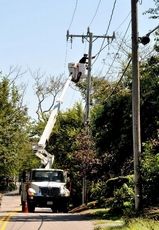
Creating Cape electric company sparks interest

An NStar employee works to restore power in homes in East Dennis following Hurricane Irene in August. The Cape is a natural place to start a municipal lighting company because it would provide more control and better service, say some experts.
Cape Cod Times/Jim Preston
By Patrick Cassidy pcassidy@capecodonline.com
October 30, 2011
Would Cape Cod benefit from having its own electric company?
According to some utility experts, the region could receive substantial advantages from a municipal lighting company, or "muni" as it's known in shorthand.
"From my standpoint, I would certainly support looking into it for Cape Cod," state Rep. Randy Hunt, R-Sandwich, said during an interview Friday.
Hunt, a member of the Joint Committee on Telecommunications, Utilities and Energy, said a bill making its way through the Legislature would make it easier for cities and towns, and even regions like the Cape, to create munis.
In Massachusetts, munis are typically owned and operated by the town where they are located. There has been only one municipal lighting company created in Massachusetts since 1915; the 40 other munis were formed during the late 1800s and early 1900s.
After Tropical Storm Irene, officials from several Massachusetts towns began studying what it would take to form a muni. The Cape may be the best location for one, according to John Tzimorangas, chief executive officer of Energy New England, a company that supplies power and other services to many of the state's existing munis.
The Cape Cod Canal is a natural border where ownership of the grid could be delineated, said Tzimorangas, a Sandwich resident who is the former general manager of the Hingham Municipal Lighting Plant.
Munis provide more local control, better service and generally better rates, he said, adding there is no profit motive under the muni model.
If a muni is created on the Cape, it could replace or include existing energy agencies such as the Cape Light Compact and the Cape & Vineyard Electric Cooperative, he said.
"You wouldn't have a separate entity," he said.
But it would be difficult to start a regional muni on the Cape if one or more towns chose not to participate, he said.
NStar challenges advantages
NStar spokesman Michael Durand said any move toward creating a muni is fraught with potential pitfalls.
In many cases, NStar is the largest taxpayer in the communities where they operate, he said.
Muni rates were consistently lower than those of investor-owned utilities like NStar from 2004 through 2008, according to a report by the state Department of Energy Resources. In only one case was NStar's rate lower than one of the munis' rates, according to the report.
But Durand pointed out the report also shows that rates of newly formed munis could be higher than existing munis.
Even if the muni bill passes and Cape officials decide they want one here, it could be a decade or more before one is formed, Tzimorangas said, adding that any immediate savings may be limited because of the upfront borrowing and capital costs.
The largest hurdle for the Cape would be coming to an agreement with NStar on the value of their poles and wires, according to Joseph Soares, senior power supply planner at the Cape Light Compact.
Currently, utilities like NStar have considerable leverage on establishing the price for electric lines, poles and other equipment.
"We believe it's only right for the utilities to have a large say in how much the equipment is sold for," Durand said.
One of the key provisions in the proposed legislation that utilities object to is the setting of a purchase price for the equipment.
Still, some believe the Cape is uniquely suited for the transition, with the existing Cape & Vineyard Electric Cooperative the most likely entity to undertake the effort because of its existing ability to own generation and distribution equipment, Soares said.
"If there was ever a place where (a muni) would maybe fit, it would be Cape Cod," he said.
Once the cooperative finishes work on all the possible solar energy projects on the Cape, it might make sense to study whether a muni is viable, the organization's president, Charles McLaughlin, said.
"That being said, I know there is huge institutional resistance to it from NStar and others," McLaughlin said.
=================
Cape Cod Energy Agencies
Cape Light Compact: Created in 1997 to buy power in bulk for customers on Cape Cod and Martha's Vineyard. The compact also provides energy efficiency and other programs.
Cape & Vineyard Electric Cooperative: Organized in 2007 to build and operate renewable energy projects for its member communities in the region.
Cape Cod Municipal Utility: Does not yet exist. If this "municipal lighting company" is created it would own, maintain and operate the region's electric grid. This entity might take over the activities of the compact and the cooperative.
